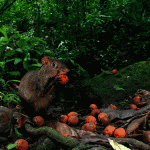
Pandas often experience mating problems. Image: Shutterstock
The tigers were initially separated by a visual barrier, which allowed them to get used to hearing and smelling each other. As they became more comfortable with each other, the barrier was removed and the keepers watched their behaviour closely. Snarling or roaring is something that Ms Lewis doesn’t really want to hear, as it indicates that they are still not comfortable with each other.
“We look for signs that the female is proustening or chuffing, which is a nice welcoming vocal which means “˜I don’t mean any harm’.”
Once they appeared to be comfortable with each other, they were properly introduced. But, as many humans can attest, not every first date goes smoothly. Satu and Jumilah were interested in each other, but he had some problems figuring out the mechanics of sex. As a result, Ms Walraven explains, Jumilah became ‘ratty’ with him and they had to be separated.
After a few attempts at getting them to breed, Satu was given a thorough veterinary and reproductive assessment in case there was something anatomically wrong with him. However, he passed his physical and Ms Lewis and the other keepers waited for another opportunity to introduce them. She says they take their cues from the animals, whose behaviour and hormones indicate when they should be introduced and when it is not a good time to put them together.
“Even before the female comes into oestrus, you will see them sitting on either side of the slide separating them, as opposed to staying on completely opposite sides,” Ms Lewis says. “Then when she does come into oestrus you might see signs such as cheek rubbing against the mesh.”
Timing may be everything for tigers, but other species may require a more romantic environment to get into the mood. This can be as simple as changing the water temperature, adding nesting materials or providing different foods.
“We manipulate the environment to give them the best chance,” Ms Walraven says. “That is so exciting, it’s so much fun to really delve into it.”
Other zoos have reported that some species of frogs need simulated rain before they will even consider breeding, while others just want to hear the sounds of rain falling. In more extreme cases, zoos in China and Thailand have reported using “˜panda pornography’ — images of other pandas mating — to get individuals who were having mating difficulties in the mood.
Satu eventually figured out what he was meant to be doing, through trial and error rather than video instruction, and is now the proud father of Sakti, Kartika and Kembali, who were born in August 2011. Like other captive endangered species, the cubs will continue to reside in zoos because, until threatening processes such as hunting and habitat destruction are fixed, it would be irresponsible and redundant to release these animals. Zoos are often described as Noah’s Arks, acting as a safety net in case a species becomes extinct in the wild.
“There’s a lack of places for Sumatran tigers to live,” Ms Walraven says. “We need to manage these animals in the time that they’re with us.”
But in every zoo there are capacity limitations; even the Ark could only take animals two by two. The curators only try to breed species if there is a role for their offspring in a regional or global breeding program. So not every animal in captivity will find love online.
If you want to read more about Taronga’s online dating program for animals, check out the new issue of Science Illustrated — on sale May 16.






